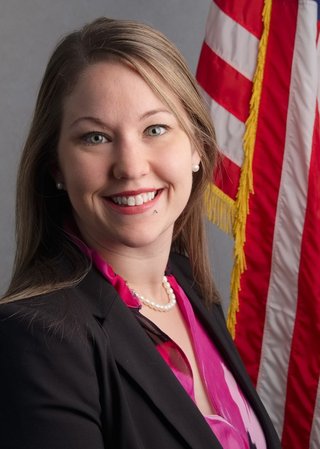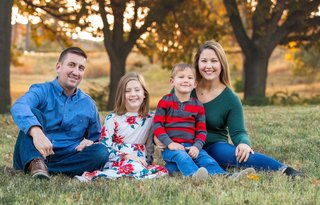Employee Profile: Abbi Warmker
January is Human Trafficking Awareness Month. The Health and Human Services Office of Inspector General (HHS-OIG) is committed to helping improve HHS programs dedicated to fighting human trafficking.
Abbi Warmker, the Deputy Regional Inspector General for Evaluation and Inspections in Kansas City, plays a significant role in HHS-OIG’s work identifying potential issues in programs designed to protect children from human trafficking. Abbi has used her research skills and passion for helping children to lead several studies that have improved the lives of hundreds of children in the foster care system.

Abbi Warmker applied on a whim to HHS-OIG. Born and raised in Iowa, Abbi thought she wanted to be a school psychologist and work with children for a career. She began a psychology program at the University of Kansas, but as she began working as a research assistant, she became more drawn to research and making tangible impact through policy change. She decided to pursue a different path and began the master’s program in public administration instead. In this program, she got an email with a job posting for a social science research analyst at HHS-OIG. Drawn to the description of conducting research on health and human programs, she applied the day the posting closed, submitting her application just minutes before the deadline. Abbi admits she knew little about the type of work HHS-OIG did, but this spur of the moment decision to apply to HHS-OIG has led her to some of the most rewarding research in her career. As Abbi recalls this moment, she describes it as stars aligning.
Throughout her seven years with HHS-OIG, Abbi has made significant impact with her research. When reflecting on all the work she has done, Abbi points to the Kansas City portfolio on foster care work as her proudest accomplishment. Getting to tap into her passion for helping children, Abbi served as lead for several reports that evaluated the foster care system in various states. These studies showed gaps into how foster care programs protect children, including not reporting children who were missing to local law enforcement or not monitoring children who were treated with psychotropic medications. As a result of her research and recommendations, Abbi has seen one state change their state law to improve requirements around protections for children in foster care. In addition, another state used her research to develop a checklist for caseworkers to help improve tracking of foster care requirements. Abbi stated that it was “really amazing to see real positive change” due to the work and advocacy of her team.
As Abbi continued to advocate and improve the conditions for children in foster care, she came across requirements for protecting children from sex trafficking, which sparked the idea for her next series of research. Specifically, Abbi wanted to examine the extent to which states were screening children who return after going missing from foster care for trafficking, as required by law. This idea turned out to be timely as her team received a call from fellow HHS-OIG agents in the Office of Investigations about concerns they had with systematic issues within the Missouri foster care program, with regards to tracking and protecting children who were missing. Children who are missing from foster care are at greater risk of becoming victims of trafficking, so this really became a motivation for Abbi to explore how states can better protect these children from harm. In 2021, Abbi and her team released results from an evaluation on the Missouri foster care system, and found minimal evidence of case managers assessing whether children were trafficked while missing from care. In 2022, Abbi and her team examined five more States and released a report that found similar trends to Missouri. Abbi emphasized this is concerning as “it is important to identify those who may become victims of sex trafficking so they can work to prevent that from happening.” As a result of this work, Abbi hopes more foster care programs take human and sex trafficking and missing children seriously. Abbi describes how foster care caseworkers have a difficult task, with high caseloads, low resources, and countless requirements to track. Abbi hopes these evaluations show the importance in preventing children from becoming victims to human and sex trafficking, as one child who becomes a victim is still too many.
Abbi also discussed that there are several things everyone can do to prevent human trafficking, including trafficking of children. First, be aware of who is talking to a child, especially online. Abbi describes a common technique of traffickers is to groom vulnerable children on social media and chat boxes. Second, check in with those you see that may be isolated or feel disconnected. Those who are isolated are at greater risk of being targeted for trafficking.
There are a lot of misconceptions about human trafficking. It is often not people getting abducted off the street, but rather the victim being lured away through an individual who initiates a relationship with the victim. Abbi emphasized that both male and female youth are at great risk for human trafficking. All children are vulnerable to trafficking, especially those who are in foster care, so we can all do our part to help protect them. The Office on Trafficking in Persons, within the Administration of Children and Family, has resources to help us fight and end trafficking.

When Abbi is not improving the lives of children, she is off enjoying adventures with her own family. She enjoys hiking with her husband and two children, Harper and Hayden, ages 8 and 4 respectively. Her family’s latest adventure is riding around in the new go-kart Harper and Hayden received for Christmas. In her downtime, which Abbi admits there is not much of with her two energetic kids, she enjoys the quiet of reading a book to de-stress.
When describing her favorite aspect of working at HHS-OIG, she immediately points to the people. She states, “it is really enjoyable to spend your days having really thoughtful and intriguing conversations with your colleagues,” including conversations on ways to improve the health of the American people. In addition, Abbi loves her ability to find and choose new research topics to ensure HHS and other health programs are run responsibly and effectively. Abbi describes this process of finding new ways to have impact as fun and an opportunity to drive positive change.
For those interested in social science research, including studies in preventing human and sex trafficking, Abbi’s advice is to just do it. She says there are “endless opportunities to find new research questions or new ways in which the programs can be improved.” While the programs HHS-OIG evaluate may be massive and complex, new ideas is how HHS-OIG and other stakeholders can improve these programs. Abbi also recommends seeking out advice and knowledge from others. There are many talented researchers, investigators, lawyers, and auditors who protect HHS programs every day. Learning from their experiences will help the next generation continue to make a positive impact.
If you are interested in learning more about what you can do to prevent human trafficking, check out https://www.acf.hhs.gov/otip/about/ways-endtrafficking.
If you or someone you know is a victim of human trafficking, you can get support and services by contacting the National Human Trafficking Hotline at 1-888-373-7888.
